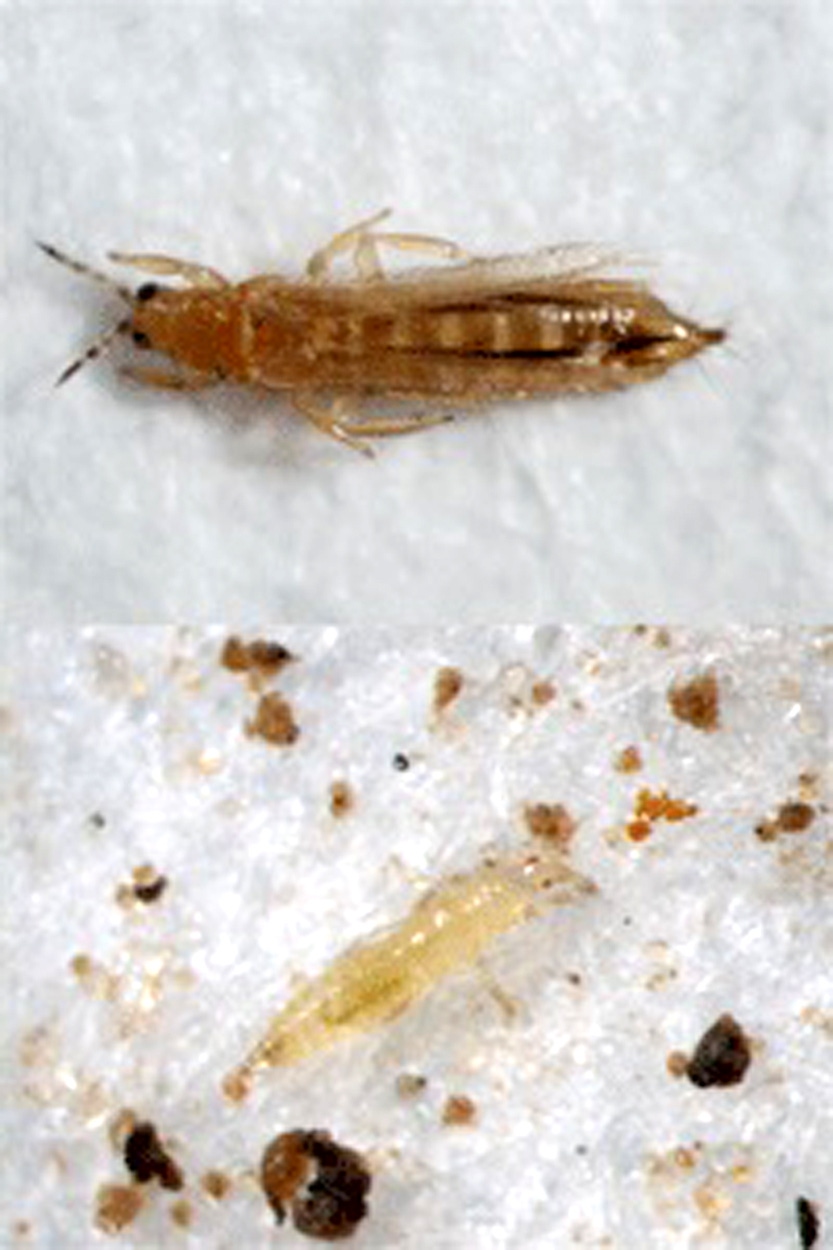May 16, 2016

Cotton thrips moving into High Plains cotton fields; wheat producers looking at canola for rotation; more spring wheat possible for South Texas; hay bales represent valuable investment; and a new IPM specialist is named for Runnels, Tom Green and Concho counties.
These stories are recent featured from Texas AgriLife media.
AgriLife Extension entomologist: Monitor and treat early for cotton thrips
With cotton planting underway across the High Plains, a Texas A&M AgriLife Extension Service entomologist is warning producers to be on the lookout for thrips and be prepared to treat.
The most critical time for controlling thrips is the first two weeks after plant emergence, said Dr. Ed Bynum, AgriLife Extension entomologist in Amarillo.
“It is important to control thrips before there is significant damage,” Bynum said. “Research has shown that if you use foliar insecticides and wait until you see damage or until you make an herbicide spray, the damage from thrips has already been done.”
Wheat producers eye canola in crop rotations
Texas A&M AgriLife Research is conducting several studies on canola in both the Rolling Plains and High Plains regions as interest in the crop continues to grow.
The canola plots were showcased recently at field days at both the AgriLife Research Chillicothe Station, south of Chillicothe in the Rolling Plains, and at the AgriLife Research Bush Farm, 600 Farm-to-Market Road 2381 north of Bushland in the Panhandle.
Dr. Clark Neely, Texas A&M AgriLife Extension Service small grains and oilseed specialist in College Station, said interest in canola is growing as wheat producers look for a rotational crop that allows the use of herbicides to clean up grassy weeds in their fields.
Mild winter could result in more spring wheat in South Texas
A mild winter may have some South Texas producers switching from winter wheat varieties to spring wheats, according to a Texas A&M AgriLife Extension Service specialist.
Dr. Clark Neely, AgriLife Extension small grains specialist in College Station, said the mild winter created some vernalization issues in the winter wheat growing region around San Antonio and south.
“Essentially we had such a mild winter that the wheats typically grown in the San Antonio area stayed vegetative and never produced a seed head,” Neely said. “So that brings up the conversation of should we be planting a hard red spring wheat variety instead of hard red winter wheat.”
Hay bales are an investment worth protecting
Springtime hay season is ramping up and Texas A&M AgriLife Extension Service agent Fred Hall, Tarrant County, wants to remind producers that bales are an investment worth protecting.
Hay quality is a key component to animal performance and proper hay storage is a key component to hay quality, Hall said. Hay loss can be expected, even under a barn, so mitigation and risk management are the keys to protecting as much of your investment as possible.
“They get a fantastic bale made and by not moving them off-field they endanger the stand and lose quality forage for their livestock,” Hall said. “Storing bales properly can reduce losses and save producers money.”
Once bales have cured they should be taken to a permanent storage area and stacked, he said. The cutting, baling and hauling represents much of the cost of baled hay. Depending on yield, a 1500-pound bale can cost up to $45 to cut, roll and transport.
If the bale is valued at $100, the forage in the bale is worth $55. It makes sense to protect bales and the $45 per-bale investment as much as possible, Hall said.
AgriLife Extension names new integrated pest management agent
The Texas A&M AgriLife Extension Service has named Joel Webb as the integrated pest management agent for Runnels, Tom Green and Concho counties.
Dr. Charles Allen, AgriLife Extension state integrated pest management coordinator at San Angelo, made the announcement.
Webb will start June 1 and be headquartered at 613 Hutchins Ave, Suite 302 in Ballinger. His office number will be 325-365-5212.
Webb previously worked with Dr. Wayne Keeling, Texas A&M AgriLife Research weed scientist, on field crop weed management and with Dr. Russ Wallace, AgriLife Extension vegetable specialist, on vegetable and horticultural crops at Lubbock.
You May Also Like




